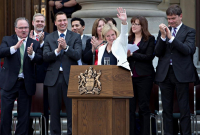Support strong Canadian climate journalism for 2025
OTTAWA — The advent of new leadership in Ottawa and Alberta will allow Canada to shed its international reputation as an environmental pariah, premiers asserted Monday as they arrived for their first formal meeting with a prime minister in nearly seven years.
Premiers praised Justin Trudeau's willingness to take national leadership on the climate change file at next week's United Nations climate summit in Paris.
And they applauded Alberta Premier Rachel Notley for unveiling Sunday a climate strategy that includes a hard cap on greenhouse gas emissions from the oilsands, which have been labelled "dirty oil" by international critics, including U.S. President Barack Obama, and have become a symbol of Canada's alleged environmental neglect.
British Columbia Premier Christy Clark said the international focus on the oilsands has obscured measures provinces have been taking to combat climate change, including B.C.'s carbon tax which she labelled the best in the world.
"We have had a black eye for a long time on environmental issues and we have not deserved it," she said.
"But now we're getting a chance to show the world really what we've been doing all these years and I think they'll be a little bit surprised."
The first minister's meeting is not expected to produce any new national target for reducing emissions or policies for achieving it. It is aimed more at demonstrating a new tone in the run-up to the Paris summit. Within 90 days of the summit, Trudeau has promised to hold another first ministers conference to hammer out a national climate strategy.
At that point, the prime minister will have to mediate conflicting demands from premiers over how to disperse the billions he's promised in federal funding to help provinces reduce their carbon footprint.
But the potential for a squabble over money didn't dampen premiers' enthusiasm Monday for finally having a federal partner in the fight against climate change.
Under former prime minister Stephen Harper, B.C.'s Clark said Canada tended to "talk about economic growth more than the environment on the international stage." She predicted Trudeau will do a good job in Paris of emphasizing the country's environmental stewardship.
"We're really lifting the curtain on Canada's success to show the world and we can only do that if we have a strong voice on the international stage. And that is a big change for us," she said.
Moreover, having Alberta, the primary oil-producing province, on side in the fight against climate change "is going to tell the world that we really are doing a lot," Clark added. "It's really going to make a difference."
Notley's plan includes imposition of a carbon tax and phasing out coal-fired power plants.
Quebec Premier Philippe Couillard said Paris presents an opportunity to "rebrand" Canada.
"Our country needs a serious effort in rebranding on this theme of climate change and energy," he said.
"Not only are we an important producer of oil ... but we're also the third largest producer of hydroelectricity in the world."
With Alberta's new plan added to measures already taken to curb carbon emissions in B.C., Ontario and Quebec, Couillard added that almost 80 per cent of Canadians are now living in jurisdictions that have imposed a price on carbon.
"Nobody knows that in the world," he said. "It has to be known, it has to be said, it has to be repeated."
While his fellow premiers waxed enthusiastic about the leadership shown by Notley and Trudeau on the climate file, Saskatchewan's Brad Wall sounded the one note of caution. He noted that some 30,000 jobs have already been lost in Canada's energy sector with the plunge in oil prices over the past year.
"We can't forget the economy," he said. "We cannot forget the jobs that quite literally are at stake in a sector that's undergoing a lot of stress right now due to $40 oil. We've got to find that right balance."
He was also less glowing than other premiers about Alberta's plan, remarking only that it "removes an excuse" used by some critics who have objected to pipelines because western provinces weren't doing enough to combat climate change.
Saskatchewan announced earlier Monday that SaskPower will develop wind, solar and geothermal power with the goal of providing 50 per cent of its electricity from renewable sources by 2030. The utility would still use some coal-fired power.
Wall reiterated his concern that the Trudeau government has talked about setting a more ambitious target for emission reductions than the Harper government, which proposed last spring a 30 per cent reduction below 2005 levels by 2030 — a target Wall had already complained would be "onerous" for his province.
For his part, Trudeau offered no new details as he opened the public portion of the gathering. Rather, he quickly ceded the stage to Notley, giving her a national podium from which to tout Alberta's new climate plan, which he called "historic" and "a strong positive step in the right direction."
"Today we come together in our national capital for the first time in a very long time to speak the truth about climate change, to stop denying there is an issue and to begin doing our part instead," Alberta's NDP premier said.
Before Trudeau and the premiers went behind closed doors, they were treated to a presentation from climate scientists, intended to persuade Canadians of the seriousness of the climate change crisis and to demonstrate that the Trudeau government is determined to craft public policy based on evidence, not politics.
Federal NDP Leader Tom Mulcair welcomed the Trudeau government's new tone on climate change but warned that words have to be backed by real action.
Conservative environment critic Ed Fast urged the Liberals to make sure Canada's economic interests are not hurt by ambition on climate change.
Joan Bryden, The Canadian Press



Comments